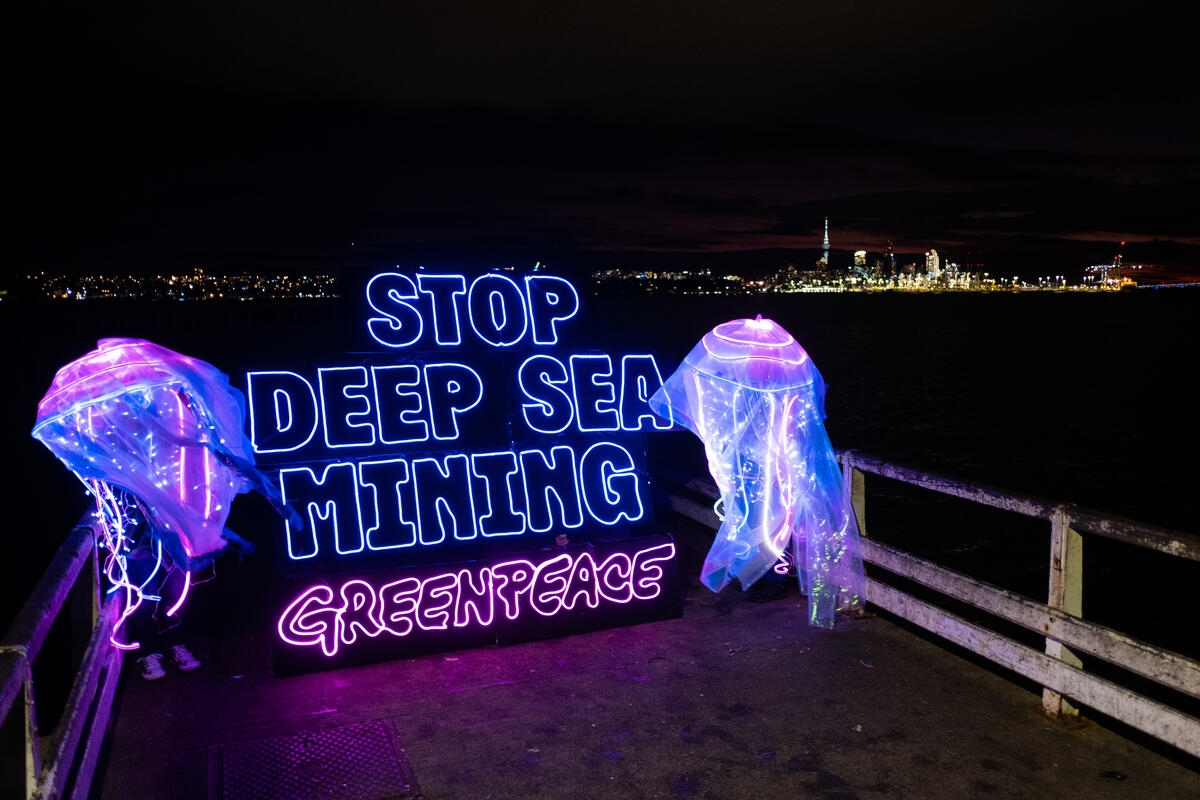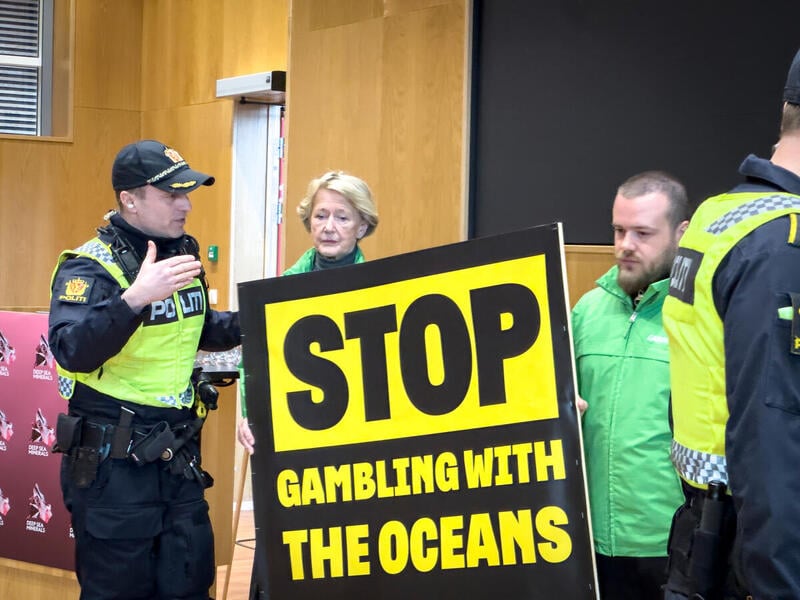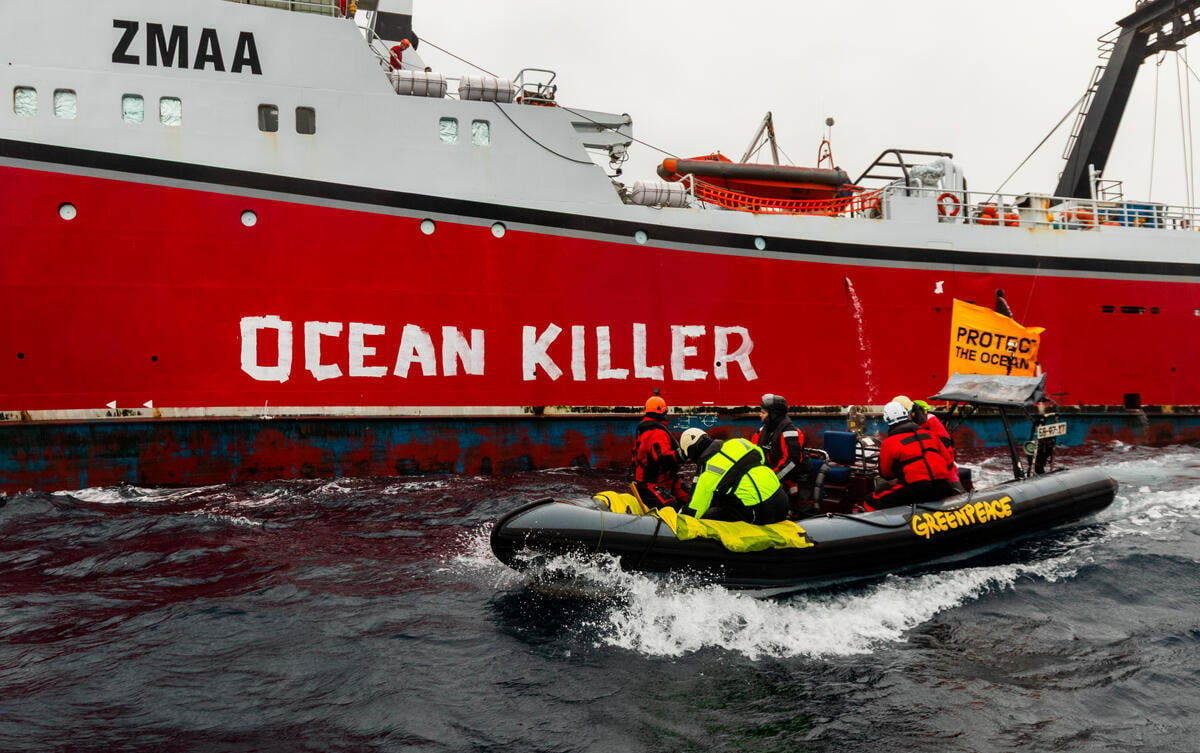Zurich – Greenpeace Switzerland activists interrupted The Metals Company CEO’s speech at an international meeting for investors in Zurich to highlight the risks of deep sea mining. Activists held banners that read “Stop Deep Sea Mining”, visible behind Gerard Barron through a window of The Dolder Grand conference hall.
Iris Menn, marine biologist and Executive Director of Greenpeace Switzerland said: “The deep sea is one of the largest habitats and one of the last barely touched ecosystems. Commercial exploitation would destroy its biodiversity and risks releasing climate-damaging carbon stored in its sediments. Deep sea mining companies promise to deliver a green future built on metals that studies show the seabed simply won’t provide. Banks and investors should steer clear of this greenwash and break ties with businesses that are incompatible with a sustainable future”.
While investors gather in Zurich, governments at the International Seabed Authority (ISA) [1] are meeting in Jamaica to negotiate whether to allow deep sea mining to start or not. In a bid that aims to put pressure on delegates at the ISA and rush the start of deep sea mining, Canadian The Metals Company, partnered with the Pacific island Nauru in 2021, triggered the “two-year rule”, an obscure and controversial legal loophole that sets an ultimatum for governments.
Diplomats at the ISA accused its head, Michael Lodge, of having lost the impartiality demanded by his position and having interfered with the decision making of governments parties to the ISA, as they attempt to hold full control over whether or not to permit the first commercial mining licence expected this year.
Arlo Hemphill, Oceans Campaigner, Greenpeace USA at the ISA meeting in Jamaica said: “Although outrageous, diplomats’ claims don’t come as a surprise, as Mr. Lodge has reportedly been seen in close contact with industry’s members. He was even part of one of Barron’s company promotional videos. Now all governments at the ISA must make that choice in the best interests of humanity – not the timeframe imposed by a company reportedly running out of cash”.
International opposition to this risky activity is growing not only at the ISA [2]. In a blow to the emerging industry, businesses including BMW, Volvo, Google and Samsung committed to excluding the use of ocean-mined minerals while more than 700 scientists from 44 countries signed a call «to pause deep seabed mining». Moreover, analysts at the London-based consultancy Watson, Farley & Williams said it may prove difficult or even impossible to justify investing in deep sea mining.
ENDS
Photos and video available from the Greenpeace Media Library
Notes
[1] The International Seabed Authority (ISA) is an autonomous international organization established under the 1982 United Nations Convention on the Law of the Sea (UNCLOS) ISA has 168 Members, including 167 Member States and the European Union.The ISA’s mandate is to preserve the international seabed and control all mineral-related activities, including issuing licences. It has so far issued exploration licences, 19 for manganese nodules, 7 for massive sulphides and 4 for manganese crusts.
[2] Countries currently asking for a ban, moratorium or precautionary pause on deep sea mining.
Contact
Iris Menn, Marine Biologist, Executive Director Greenpeace Switzerland, +41 79 886 75 92, [email protected]
Roland Gysin, Media Spokesperson, Greenpeace Switzerland, +41 44 447 41 17, [email protected]
Greenpeace International Press Desk: [email protected], +31 (0) 20 718 2470 (available 24 hours)



